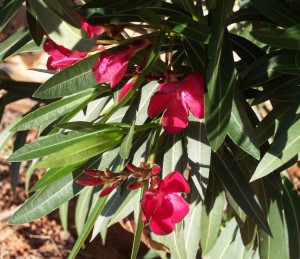Dog Dies From Eating Poisonous Plant
March 25, 2012 by admin
Filed under Uncategorized
Dog owners need to prevent their dog being poisoned by ensuring they don’t have access to toxic plants.
Common plants that are poisonous to dogs include Apocynaceae species (Oleander), Viscum album (Mistletoe) and also Phoradendron (which is also known as Mistletoe); Euphorbia species (Castor oil plant, Coral plant, Petty spurge, Chinese tallow tree, Poinsettia, Zigzag plant, Naked lady, Acalypha, etc); Araceae species (Arum lily/Calla lily, Dieffenbachia/Dumb cane), some Solanaceae species especially Blackberry nightshade, Brazilian nightshade, Cestrum, Datura or Angels trumpet, Chalice vine or Golden cup, etc; Asclepias species (e.g. Balloon cotton bush, Red-head cotton bush, etc), Azaleas; the seeds and rhizones of the Zamia species (Cycadaceae and Zamiaceae) referred to as ‘Cycads’ and including the Sago Palm (refer to article below); Ranunculus species (Larkspur, Delphinium, Celery buttercup); Yew; Hemlock (Conium maculatum); some of the Verbena plant species (e.g. Lantana; the berries from Duranta repens) and many more plants that have toxic compounds can cause illness or even death in dogs.
The following article sadly illustrates what happened as a result of a dog eating a poisonous plant:
Atherton police dog dies after eating leaves of popular sago palm plant
By Bonnie Eslinger Daily News Staff Writer Mercury New.com 23.12.11Though trained like all other K-9 dogs to handle dangerous situations in the hunt for criminals, a German shepherd used by the Atherton Police Department recently died after eating the leaves of a popular garden plant.
The canine, named Lotty, died Nov. 30 after ingesting the parts of a sago palm in the backyard of her handler, Officer Dean DeVlugt, according to the police department.
When their work is done police dogs go home with their handlers and become “part of the family,” said police Lt. Joe Wade.
Lotty was usually “a bundle of energy” but gradually became lethargic after eating the plant over the course of a week or so, Wade said. Concerned, DeVlugt took the dog to the vet, but by then it was too late.
Veterinarians “tried valiantly to save Lotty, but the poison from the deadly plant shut down her liver,” Interim City Manager John Danielson wrote in a memo to the town council last week.
Sago palms look like short trees and have become a popular landscape option in recent years.
According to Redwood City veterinarian Cathy Jennings, who did not treat Lotty, a sago palm is on a list of eight plants considered common garden poisons for pets that she gives to all her clients.
The other plants include azaleas, Easter lilies, lantanas, mistletoe, nightshades, oleander and yew.
Jennings said it’s not uncommon for pets such as Lotty to die from eating such plants, especially around the holidays with so much mistletoe around as well as poinsettias, which are toxic but not deadly.
If a pet has eaten a poisonous plant, the owner should take it and a sample of the plant to a veterinarian, she said. A poison control hotline can also give advice, she said.
Lotty’s death hit Atherton’s police department hard, Wade said. She was almost 4 years old and had been with the department since she was 2.
“Everybody loved her, how can you not love a dog that’s so happy?” he said. “She was overly jubilant to be at work.”
Police dogs assist in searches of buildings and other locations to help find and apprehend dangerous suspects, he said. Lotty was specially trained to follow a scent.
Please consult a qualified animal naturopath for advice about nutritionally-balanced diets and naturopathic medicines for the treatment of animals.
Yours In Great Health,
Sar Rooney BHSc., DC., ND., DASc., GDSc. (Hons) Zoology, MHATO, MATMS
Naturopathic Practitioner, Researcher, Lecturer, Canine Naturopath
Science-Based Naturopathy for Canine Wellbeing
Canine naturopathic health care with a clinical focus on skin conditions, inflammatory bowel disorders, chronic infections, arthritis and disease prevention.
Helping dogs achieve optimal wellness with personalised, professional naturopathic health care and individually-prescribed high-quality herbal medicines and supplements
Naturopathic Animal Services W: www.animalnaturopath.com.au E: [email protected] FB: http://www.facebook.com/DogNaturopath
Appointments are available by email, phone & skype
Want to keep up to date on the latest in dog health? Join me on Facebook:http://www.facebook.com/DogNaturopath
Disclaimer: The information provided is not intended to replace any veterinary or medical advice or treatment.



